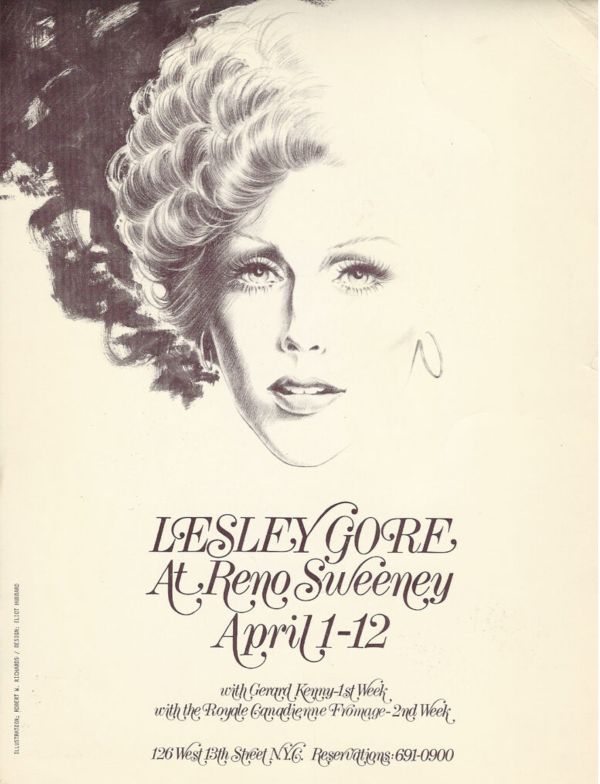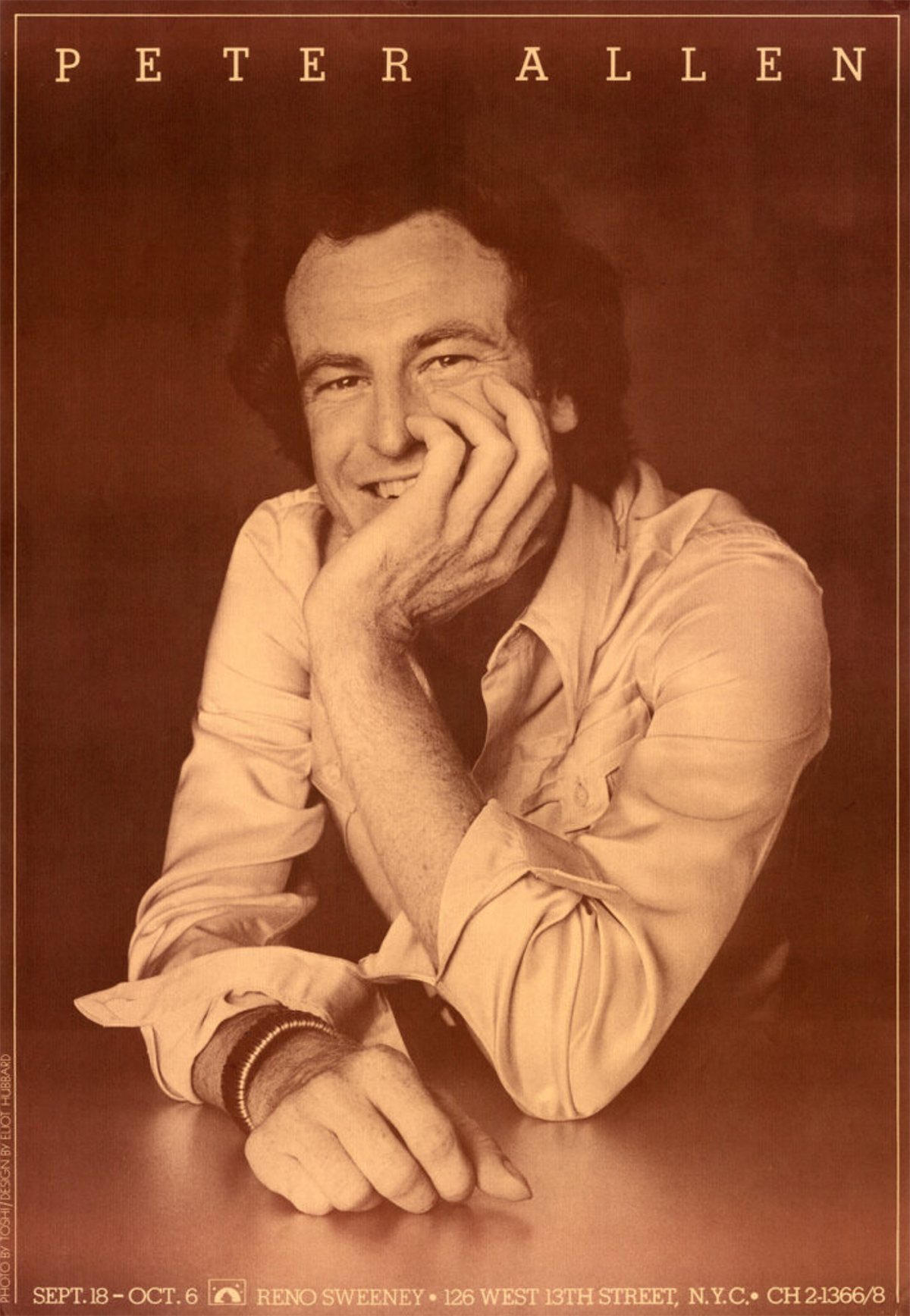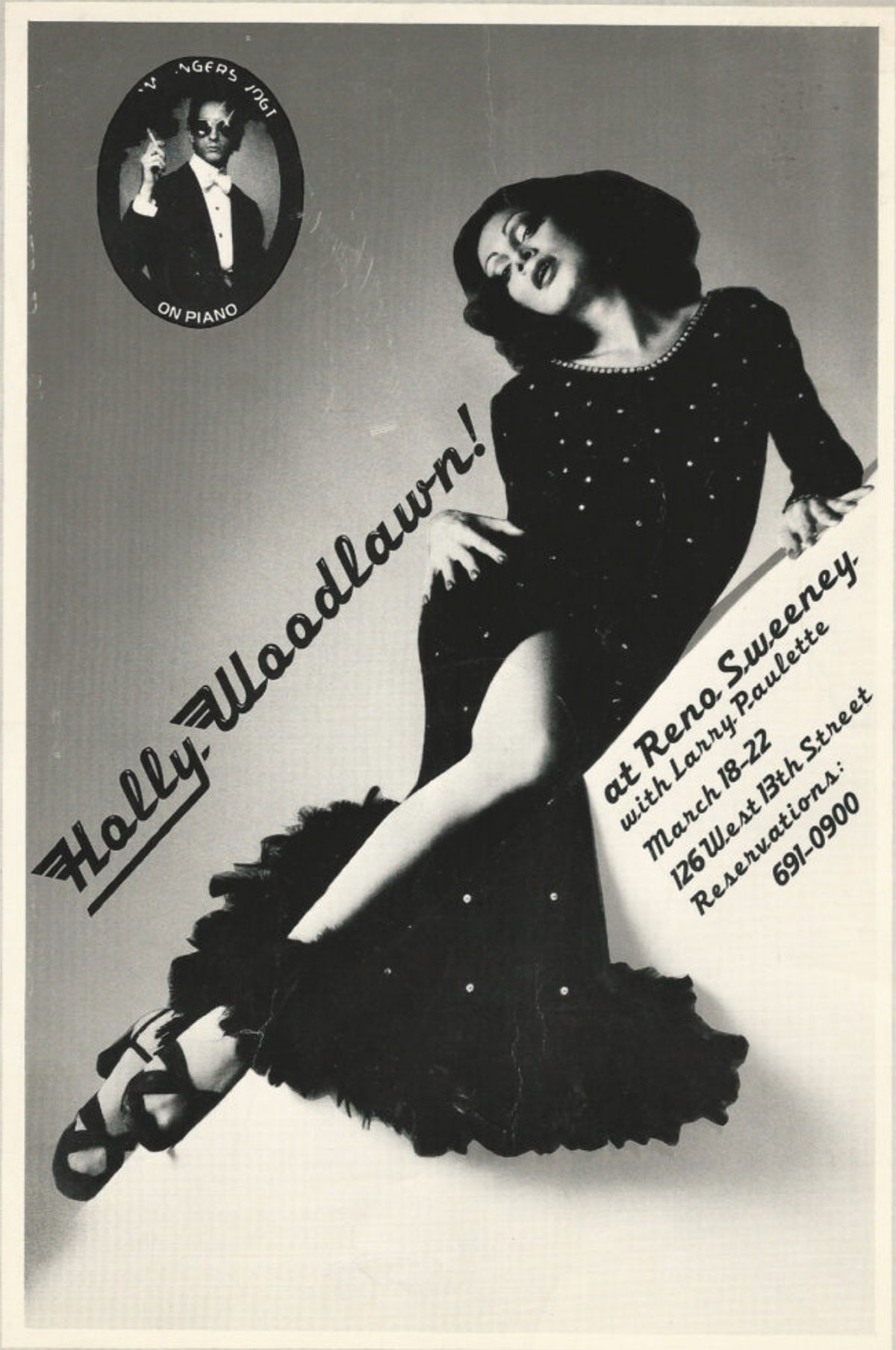
AN LGBTQ Cabaret at Reno Sweeney
In celebration of Gay Pride 2021, we’re presenting our LGBTQ Cabaret starring Lesley Gore, Peter Allen and Holly Woodlawn. They all performed at Reno Sweeney’s intimate Greenwich Village cabaret, which was named after a character from Cole Porter’s 1934 musical, Anything Goes, and ran for four years at 126 West Thirteenth Street.
Lesley Gore
Lesley Sue Goldstein (May 2, 1946 – February 16, 2015), known professionally as Lesley Gore, was an American singer, songwriter, actress, and activist. The above image is Lesley Gore at Reno Sweeney (1975), New York: Vintage original postcard, Very Good+.
“It’s My Party”
When she recorded her version of “It’s My Party” with Quincy Jones in 1963, she was a junior in high school. It became a number-one, nationwide hit as well as Gold record. It was followed by many other hits, including the sequel, “Judy’s Turn to Cry” (#5); “She’s a Fool” (#5); the feminist-themed million-selling “You Don’t Own Me“, which held at number two for three weeks behind the Beatles’ “I Want To Hold Your Hand“; as well as “That’s the Way Boys Are” (#12); “Maybe I Know” (#14); “Look of Love” (#27); and “Sunshine, Lollipops and Rainbows” (#13) Marvin Hamlisch’s first hit composition.
Gore composed songs for the soundtrack of the 1980 film Fame, for which she received an Academy Award nomination for “Out Here on My Own”, written with her brother Michael. Michael won the Academy Award for Best Original Song for the theme song of the same film. Gore played concerts and appeared on television throughout the 1980s and 1990s.
Gore co-wrote a song, “My Secret Love”, for the 1996 film Grace of My Heart. The film includes a subplot about a young singer named Kelly Porter, who is based in part on Gore and was played by Bridget Fonda. The character, who is a closeted lesbian, performs “My Secret Love” in the film.
I’m a Lesbian, End of Story
Beginning in 2003, Gore hosted several editions of the PBS television series In the Life, which focused on LGBT issues. In a 2005 interview with After Ellen, she stated she was a lesbian and had been in a relationship with luxury jewelry designer Lois Sasson since 1982. She had known about her attraction to women from the time she was 20 and stated that although the music business was “totally homophobic”, she never felt she had to pretend she was straight. “I just kind of lived my life naturally and did what I wanted to do,” she said. “I didn’t avoid anything, I didn’t put it in anybody’s face.”
Gore had been working on a memoir and a Broadway show based on her life when she died of lung cancer on February 16, 2015, at the age of 68. At the time of her death, Gore and Sasson had been together for 33 years.
Her New York Times obituary stated, “with songs like ‘It’s My Party,’ ‘Judy’s Turn to Cry’, and the indelibly defiant 1964 single ‘You Don’t Own Me’ — all recorded before she was 18 — Gore made herself the voice of teenaged girls aggrieved by fickle boyfriends, moving quickly from tearful self-pity to fierce self-assertion.” (Wikipedia)
Peter Allen

[New York]: Reno Sweeney, [1974]. Vintage original 22 x 15″ poster, unfolded, Fine
Peter Allen (born Peter Richard Woolnough; 10 February 1944 — 18 June 1992) was an Australian singer-songwriter, musician and entertainer, known for his flamboyant stage persona, boundless energy, and lavish costumes. His songs were made popular by many recording artists, including Elkie Brooks, Melissa Manchester and Olivia Newton-John, with one, ‘Arthur’s Theme (Best That You Can Do)’ by Christopher Cross, winning an Academy Award for Best Original Song in 1981.
In addition to recording many albums, he enjoyed a cabaret and concert career, including appearances at the Radio City Music Hall riding a camel. His patriotic song ‘I Still Call Australia Home,’ has been used extensively in advertising campaigns, and was added to the National Film and Sound Archive’s Sounds of Australia registry in 2013.
Liza Minnelli and AIDS
Allen was the first husband of Liza Minnelli. They married in 1967, separated in 1969 and were divorced in 1974. He had a long-term partner, model Gregory Connell (1949-1984). They were together from 1974 until Connell’s death in 1984. Peter and Greg both died from AIDS-related illnesses eight years apart, with Allen becoming one of the first well-known Australians to die from AIDS. Allen remained ambiguous about his sexuality in that he did not pretend to be straight after divorcing Minnelli, but never publicly came out as gay either.
Despite Allen’s outgoing persona, he was an intensely private man who shared little about his personal life even with those close to him. Few people knew he had HIV/AIDS, partly in fear of alienating his conservative, heterosexual fans and thinking audiences would not want to see a performer they knew was sick. In 1998, a musical about his life, The Boy from Oz debuted in Australia. It ran on Broadway and earned Hugh Jackman a Tony Award for Best Actor in a Musical. (Wikipedia)
Holly Woodlawn

New York: Reno Sweeney, 1975. Vintage original postcard, Very Good+.
Holly Woodlawn was born in Juana Díaz, Puerto Rico, to a German-American father who was a soldier in the U.S. Army, and Aminta Rodriguez, a native Puerto Rican, and grew up in Miami Beach, where she came out at a young age. She adopted the name Holly from the heroine of Breakfast at Tiffany’s and in 1969 added the surname from a sign she saw on an episode of I Love Lucy. After changing her name, she began to falsely tell people she was the heiress to Woodlawn Cemetery.
In 1962, at the age of fifteen, Woodlawn ran away from home, leaving Florida heading north. She recollected that “I hocked some jewelry and … made it all the way to Georgia, where the money ran out and … had to hitchhike the rest of the way” to New York City. She recalled in her memoir, A Low Life in High Heels, “At the age of 16, when most kids were cramming for trigonometry exams, I was turning tricks, living off the streets and wondering when my next meal was coming.” By 1969, she had considered sex reassignment surgery, but decided against it.
Andy Warhol and Trash
Woodlawn met Andy Warhol at the Factory, at a screening of Flesh (1968). Through him she met Jackie Curtis, who cast Woodlawn in her play Heaven Grand in Amber Orbit in the autumn of 1969.
In October, she originally was given a bit role in Trash, but so impressed director and screenwriter Paul Morrissey that he re-wrote it to give her a much larger role. In Trash, Joe Dallesandro plays a heroin addict on a quest to score who, ambivalent about his sexuality, has a transgender girlfriend played by Woodlawn. In October 1970, she received word from the Academy of Motion Picture Arts and Sciences that George Cukor, supported by others, was petitioning the Academy to nominate her for Best Actress for her work in Trash, but nothing came of this.
Transgender Diva
When Holly Woodlawn appeared in public she would dress as a dazzling alternative image of Jean Harlow, complete with wig and frosted lipstick. She presented as a glamorous actress, saying, “I was very happy when I gradually became a Warhol superstar. I felt like Elizabeth Taylor. Little did I realize that not only would there be no money, but that your star would flicker for two seconds and that was it – the drugs, the parties, it was fabulous.”
In the opinion of Vincent Canby, “Holly Woodlawn, especially, is something to behold, a comic book Mother Courage who fancies herself as Marlene Dietrich but sounds more often like Phil Silvers.”
Cabaret Artiste
Woodlawn’s first cabaret engagement was a solo act in 1973 at Reno Sweeney in New York. The following year, she performed with Jackie Curtis in “Cabaret in the Sky” at the New York Cultural Center. In the early 2000s, she resumed performing cabaret in sold-out shows in New York and Los Angeles. She continued to travel with her cabaret show, most recently appearing in Manhattan’s Laurie Beechman Theater in 2013.
Woodlawn fell seriously ill in June 2015, and was hospitalized at Cedars-Sinai Medical Center in Los Angeles. On December 6, 2015, Holly Woodlawn died of brain and liver cancer.
Recognition and Contribution
Woodlawn was included during the In-Memoriam segment at the 88th Academy Awards.
Woodlawn’s estate founded the Holly Woodlawn Memorial Fund for Transgender Youth at the Los Angeles LGBTQ Center.
- African American Movie Memorabilia
- African Americana
- Black History
- Celebrating Women’s HistoryI Film
- Celebrity Photographs
- Current Exhibit
- Famous Female Vocalists
- Famous Hollywood Portrait Photographers
- Featured
- Film & Movie Star Photographs
- Film Noir
- Film Scripts
- Hollywood History
- Jazz Singers & Musicians
- LGBTQ Cultural History
- LGBTQ Theater History
- Lobby Cards
- Movie Memorabilia
- Movie Posters
- New York Book Fair
- Pressbooks
- Scene Stills
- Star Power
- Vintage Original Horror Film Photographs
- Vintage Original Movie Scripts & Books
- Vintage Original Publicity Photographs
- Vintage Original Studio Photographs
- WalterFilm
